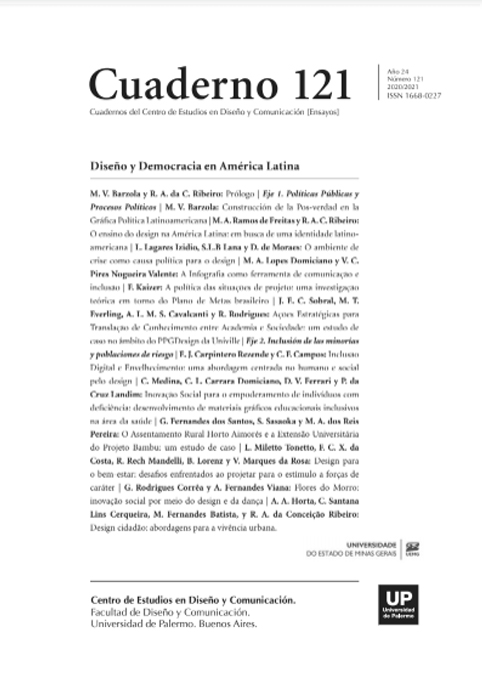A política das situações de projeto: uma investigação teórica em torno do Plano de Metas brasileiro
Abstract
In debates about design and politics, design generally appears as an instrument of politics. In this sense, design is subordinated to alien interests, be they democratic or not. Therefore, in order to reveal its own political dimension, another conception of design is necessary. In this article, following the theories accumulated since the 1960s, design is considered as a process. As designing, it is practised not only by professional designers, but by a set of agents, with diverse responsibilities and capacities. These agents converge around a problem and give rise to a design situation, fundamental to the design process. The way the design situation articulates agents toward the production of a common future reveals its eminently political nature. The Brazilian government’s Target Plan between 1956 and 1961 presents an excepcional case of a design situation, in that it reorganizes public and private agents into a parallel administration with the aim of effecting the Plan. Bypassing the opposition from the political status quo and the state bureaucracy, Juscelino Kubitschek’s organizational strategy makes it possible, in fact, to fulfill his campaign promisses in favor of national development. Finally, the study of this case from a renewed theoretical perspective reinforces the existence of a design field of knowing-and-doing.
References
Arendt, H. (2001). A condição humana (1958). Trad. Roberto Raposo. 10ª ed. Rio de Janeiro: Forense Universitária.
Aristóteles. (2005). Retórica. Trad. Manuel Alexandre Júnior, Paulo Farmhouse Alberto & Abel do Nascimento Pena. 2ª ed. Lisboa: Centro de Filosofia da Universidade de Lisboa; Imprensa Nacional-Casa da Moeda. (Obras completas de Aristóteles, vol. VIII, Tomo I)
Benevides, M. V. de M. (1979). O governo Kubitschek: desenvolvimento econômico e estabilidade política, 1956-1961 (1976). 3ª ed. Rio de Janeiro: Paz e Terra. (Coleção Estudos Brasileiros, Vol. 8)
Boland, R. & Collopy, F. (2004). Managing as designing. Stanford California: Stanford Business Books.
Bonsiepe, G. (2011). Design, cultura e sociedade. São Paulo: Blucher.
Bonsiepe, G. (2012). Design como prática de projeto. São Paulo: Blucher.
Buchanan, R. (1989). “Declaration by Design: Rhetoric, Argument, and Demonstration
in Design Pratice” (1985). In Victor Margolin (ed.). Design Discourse: History, Theory, Criticism. Chicago: University of Chicago Press.
Buchanan, R. (1995). “Rhetoric, Humanism, and Design”. In Richard Buchanan e Victor Margolin, (eds.). Discovering Design: Explorations in Design Studies. Chicago: University of Chicago Press.
Buchanan, R. (1999). “The Study of Design: Doctoral Education and Research in a New Field of Inquiry”. In Doctoral Education in Design: Proceedings of the Ohio Conference (1998). Pittsburgh: Carnegie Mellon University.
Buchanan, R. (2005). “Design As Inquiry: The Common, Future and Current Ground of Design”. In John Redmond et al. FutureGround: Proceedings of the International Conference of the Design Research Society. Melbourne: Monash University.
Campos, R. (1994). A lanterna na popa: memórias. 2ª ed. Rio de Janeiro: Topbooks.
Cross, N. (ed.). (1984). Developments in Design Methodology. Chichester, New York: Wiley.
Dewey, J. (1938). Logic: The Theory of Inquiry. New York: Henry Holt and Company.
Fry, T. (2011). Design as politics. Oxford; New York: Berg.
Junginger, S. & Faust, J. (2016). Designing business and management. London; New York: Bloomsbury Academy.
Kuttner, R. (2018). Can Democracy Survive Global Capitalism? New York; London: W. W. Norton & Company.
Lafer, C. (2002). JK e o Programa de Metas (1956-61): o processo de planejamento e o sistema
político no Brasil (1970). Trad. Maria Victoria de M. Benevides. Rio de Janeiro: Editora FGV.
Lafer, C. (2003). “O planejamento no Brasil – Observações sobre o plano de metas (1956-1961)”. In Betty Mindlin (org.). Planejamento no Brasil. 5ª ed. São Paulo: Perspectiva.
Levitsky, S. & Ziblatt, D. (2018). How Democracies Die. New York: Crown.
Lindinger, H. (1991). Ulm Design: The Morality of Objects (1987). Cambridge, Massachusetts: The MIT Press.
Lopes, L. (1991). Memórias do desenvolvimento. Rio de Janeiro: Centro da Memória da Eletricidade no Brasil. (Programa de História Oral do CPDOC/FGV)
Papanek, V. (1985). Design for the Real World: Human Ecology and Social Change (1971). 2ª ed. Chicago: Academy Chicago Publishers.
Rittel, H. (2010a). “On the Planning Crisis: Systems Analysis of the First and Second Generations” (1972). In Jean-Pierre Protzen e David J. Harris (orgs.). The Universe of Design: Horst Rittel’s Theories of Design and Planning. New York: Routledge.
Rittel, H. (2010b). “The Reasoning of Designers” (1988). In Jean-Pierre Protzen e David J. Harris (orgs.). The Universe of Design: Horst Rittel’s Theories of Design and Planning. New York: Routledge.
Runciman, D. (2018). How Democracy Ends. London: Profile Books.
Simon, H. (1996). The Sciences of the Artificial (1969). 3ª ed. Cambridge: Massachusetts: The MIT Press.
Los autores/as que publiquen en esta revista ceden los derechos de autor y de publicación a "Cuadernos del Centro de Estudios de Diseño y Comunicación", Aceptando el registro de su trabajo bajo una licencia de atribución de Creative Commons, que permite a terceros utilizar lo publicado siempre que de el crédito pertinente a los autores y a esta revista.


